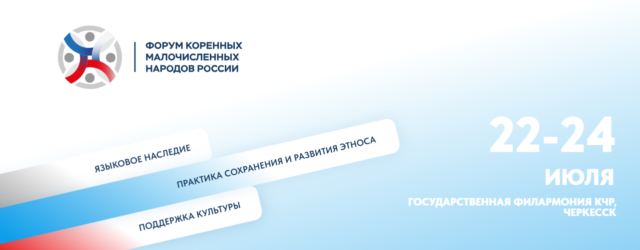
Given the significance of the North Caucasus region in the intricate Eurasian geopolitical landscape and the potential role of indigenous communities within Russian society, SpecialEurasia decided to visit the Republic of Karachay-Cherkessia to attend the Forum of Indigenous Peoples of the Russian Federation.
On July 22nd-24th, 2023, the capital of the Republic of Karachay-Cherkessia, Cherkessk, will host the Forum of Indigenous Peoples of Russia, an event organised by Ekzekov Foundation, ANO International Association for the Promotion of the Development of the Abaza-Abkhaz Ethnos “Alashara”, and the Peter the Great Museum of Anthropology and Ethnography of the Russian Academy of Sciences (Kunstkamera), as well as the local Government.
The Forum of Indigenous Peoples of the Russian Federation serves as a platform for the exchange of expert opinions and ideas on global development issues concerning small ethnic groups and indigenous peoples. It provides an opportunity to share experiences in implementing scientific, social, and educational projects, as well as to engage in discussions on strategic tasks that unite all small indigenous peoples of Russia.
This initiative is led by Mussa Ekzekov, Deputy Chairman of the People’s Assembly (Parliament) of the Republic of the Karachay-Cherkessia, Chairman of the Higher Council of the World Abaza-Abkhaz Congress, and President of the nonprofit organization “Alashara”.
The main objectives of the Forum are to discuss and develop current approaches to the preservation of languages and cultural heritage of indigenous peoples, exchange experiences and successful examples of implementing scientific, social, and educational projects aimed at preserving and developing the ethnic groups of small indigenous peoples.
The Forum also includes expert discussions and evaluations of existing strategies for the preservation and development of small ethnic groups. Additionally, the development of a basic model for the preservation of language, culture, and traditions of small indigenous peoples, the formulation of recommendations for the formation and implementation of national policies in support of indigenous languages, and the establishment of foundations for future legislative initiatives in the field of protection and development of language, culture, and traditions of small indigenous peoples.
Indigenous People in Russia: A Brief Overview
Russia is home to over 160 different ethnic groups, of which 40 are officially recognised as indigenous. These groups are incredibly diverse, but many share common characteristics such as practicing animism and having lifestyles based on hunting, gathering, fishing, and reindeer herding
Some of the smallest indigenous groups in Russia include the Enets (350 people) and the Oroks (450 people), while the largest are the Nenets and Evenkis, which both have nearly 30,000 members
Although Indigenous Peoples are not recognised by Russian legislation as such, Article 67 of the current constitution guarantees the rights of “Indigenous Small-Numbered Peoples”. The 1999 Federal Act “On Guarantees of the Rights of the Indigenous Small-Numbered Peoples of the Russian Federation” specifies that Indigenous Small-Numbered Peoples are groups of less than 50,000 members, perpetuating some aspects of their traditional ways of life. According to this and two other framework laws that were enacted during the late 1990s, Indigenous Small-Numbered Peoples have rights to consultation and participation in specific cases.
There are 47 indigenous groups living in Russia, some of them with populations of less than a hundred or even a few dozen. The 2021 All-Russian Population Census showed that the number of indigenous people has substantially declined in the last 10 years.
SpeciaEurasia’s Official Visit: Why Does It Matter?
The SpecialEurasia team’s visit to Karachay-Cherkessia for the Forum of Indigenous Peoples provided valuable insights into the challenges and tasks faced by small indigenous peoples in Russia. By actively engaging in discussions, exchanging experiences, and developing strategies, we aim to understand the importance of indigenous people and small ethnic groups within the Russian Federation.
In addition, SpecialEurasia’s official visit to the Republic of Karachay-Cherkessia serves as a valuable opportunity to deepen our understanding of the Russian Federation, particularly its multiethnic society. Recognising the importance of comprehensive knowledge about the country, our team endeavours to explore the local dynamics by immersing ourselves in the North Caucasus region.
This visit will not only contribute to our ongoing research projects and geopolitical forecasting related to the area but also enable us to collect firsthand sources and insights to support our analysis. Having previously analysed the geopolitical dynamics in the North Caucasus and the Kremlin’s regional strategy, especially in the context of the Ukraine conflict, our visit on the ground is a significant step towards strengthening our network of contacts and engaging in meaningful conversations with local officials.
This direct engagement will provide us with a more comprehensive understanding of the regional risk level and allow us to refine our assessments accordingly. Indeed, by combining our expertise with the knowledge acquired through this visit, we aim to enhance our ability to provide insightful analysis and informed forecasts concerning the North Caucasus and its geopolitical significance within the broader Eurasian context.
Do you like SpecialEurasia reports and analyses? Has our groundbreaking research empowered you or your team? Now is your chance to be a part of our mission! Join us in advancing independent reporting and unlocking the secrets of Eurasia’s complex geopolitical landscape. Whether through a one-time contribution or a monthly/yearly donation, your support will fuel our relentless pursuit of knowledge and understanding. Together, let’s pave the way for a brighter future. DONATE NOW and secure your place in shaping the geopolitical narrative.



